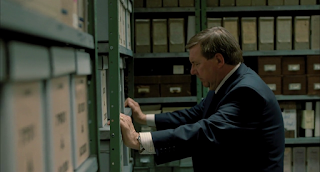The story revolves around Nawal Marwan (Lubna Azabal), survivor of an unnamed Arab country torn by sectarian violence. After a period of blood and tears, she and her twins managed to escape their homeland and into Canada.
Sensing her death was near Nawal enlisted her former boss, a lawyer, Jean Lebel (Rémy Girard), in the crafting of a last will and made him executor of her estate.
When she died, her twins Jeanne (Mélissa Désormeaux-Poulin) and Simon Marwan (Maxim Gaudette), already grown up, were shocked upon the reading of the last will when it mentioned family still lost in the old country, presumably still alive.
As if that wasn't enough of a shocker, further stipulation adds that the twins deliver letters to what they have only just learned as the family they have left so that their mother, now represented by Lebel, may agree to a proper burial.
It was as if Nawal made grand final act of guilt for not uniting her family. The twins have to finish the job for everything to be right.
Naturally they thought it crazy but Mr. Lebel reiterated that he was bound by sacred oath to uphold the wish of the dead so they were left with no choice.
At first I blamed the ending, why was it open-ended and therefore weak? Wars have little room for nuance; there should be one strong stand. Why am I left alone in making that decision?
When I gave it more thought, technically Nawal’s story did finish. To end it in her eyes, which was key, is perhaps the best anyone can hope for had this story been real. Maybe it is.
Symbolically the ending works as well. Any move beyond Nawal’s wishes makes it the choice of the twins thereby an extension of the war. It would have crossed a generation if that happened; all sides have a reason to continue and to stop. Wouldn’t stopping be better?
I think it is a mark of a great movie that you repeat it with some hope that it’ll change your mind every time you watch it. Compared to typical blockbusters which when you repeat you hope to be as thrilled but you don’t - which is why sequels often fail - movies like Incendies are the better kind.
To think that it was the pandemic that pushed me to watch it. Sure I admired Denis Villeneuve’s later works such as Prisoners, Arrival, Sicario, and Blade Runner 2049; with nowhere else to go, Incendies was me working my way back.
But the movie was spoken mostly in French. Even with the quarantine reading subtitles is not my idea of a good time plus why would I be interested in a dead Arab woman posthumously sending her children to the once war torn land of her birth?
So I had false starts before the pandemic and now I’ve seen the movie twice. Let’s just say my misgivings were misplaced and ultimately Denis’ talents did not disappoint.
Nawal’s point of origin was slightly off focus considering the country was never explicitly stated. I think this contributed to the story’s more universal slant.
Denis created the most coordinated use of two timelines in movie I have ever seen. It was a brilliant push and pull relationship between Jeanne and Simon in the present and Nawal when she was young.
Past and present, at least emotionally, feel like there are answering each other moving the story forward. Typical use of the format feels like a wait; if it having two timelines feels hazy at the beginning surely and only by the end you’ll see past and present intersect.
Prisoners is an emotional journey first, strange as it sounds clues felt like it was secondary but obviously every clue cranks up the emotion. Incendies is paced the same way. It is an emotional journey the lets you ride out a wave from past to present in one unified voice.
Also, the reading of the letters looks wooden. It only looked emotional because it was read in Nawal Marwan’s voice who at this point in the movie is a fully defined person with a message she has never had the opportunity in life to say.
“Nothing is more beautiful than being together.”

















No comments:
Post a Comment